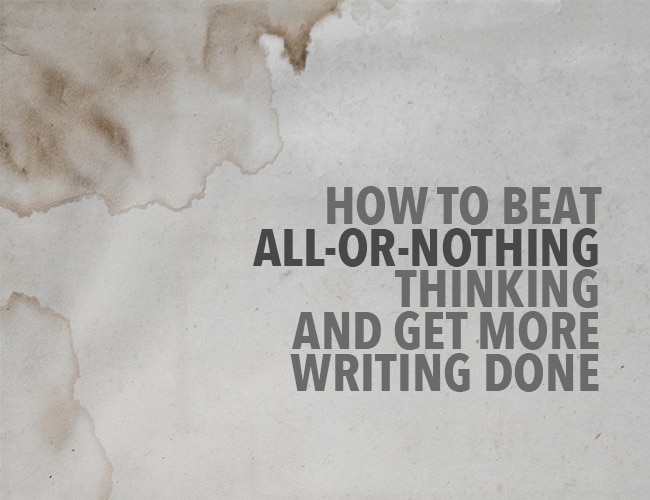It’s a new year! New goals! New motivation!
But what happens when an ER visit derails me, a work project explodes and requires far more time than I planned, or I experience some other plan-busting interruption?

Too often, I have an all-or-nothing attitude toward change and progress. If I’ve eaten off the plan for one meal today, I’m far more likely to make unhealthy choices the rest of the day, week, and month. How can I short-circuit this negative thinking pattern and abandon all-or-nothing thinking to get more writing done this year?
The Dangers of All-or-Nothing Thinking
An all-or-nothing mindset is destructive to writers because it is extremist thinking, dividing the world into two categories and often using absolute terms. Have you ever thought things like, “If I don’t finish this novel this year, I’m not a writer” or “I missed a deadline, and now I’ve failed. I never finish things”?
Notice how quickly an all-or-nothing mindset takes “I missed this one target” to personal shame, “I’m not a writer” or “I’m a failure.” It’s easy to get in a loop where we spend more time beating ourselves up than actually writing. How can we abandon this negative thinking to get more writing done?
The Real Challenge
Last month I participated in a 500 word a day writing challenge on Spar. If I missed, there was a $5 penalty for each miss. At the end of the challenge, the payment pot is distributed to those who complete the challenge with the fewest misses.
I was able to finish without missing a day (along with twenty-something others), but what inspired me most was seeing people who missed a day or two or six who kept writing and checking in. They knew they wouldn’t “win” but they kept going anyway.
What kept those writers writing? They understood that forming the habit was the real challenge — not the daily check-in. Instead of saying, “Welp, I missed a day. That’s it. I failed,” these writers kept at it, building a better habit one day at a time.
I would argue that those who kept writing after missing a day probably created a more sustainable habit than I did, simply because they didn’t give up after a miss. I am too quick to miss a daily or weekly target and then tell myself I’ll start again at the beginning of next month or season, when really, I need to start again today.
3 Antidotes to All-or-Nothing
It’s all well and good to say we should start again today. But how do you actually do that? How do you overcome that wave of discouragement and shame that comes when you miss a day, or two, or five?
Here are three strategies you can use to beat all-or-nothing thinking and actually write.
1. Abandon negative self-talk
Learn to listen to the way you talk to yourself as a writer. What message is on repeat in your head while you write? Is it positive? Negative? Would you permit someone to say those things to your child or loved one? Sometimes hearing those words out loud can help you truly hear the negative messages you’ve internalized.
If those messages are mostly negative and self-defeating, start by countering that voice. If you hear, “I can’t do this,” respond to yourself with, “. . . yet, but I will if I keep working.”
When I’m writing a first draft and the inner critic is loud and hammering in my head, I often say out loud, “Sorry, it’s not your turn, dear editor. Go sit in the freezer for now. I’ll defrost you when it’s your turn.” It’s silly and makes me laugh, but it often helps me silence that critical voice.
2. Steady, incremental change
Just like those writers on Spar who kept going after they missed a day, I need to pursue steady, incremental change instead of expecting to wake up one day inspired with the idea that will launch my writing career. Most overnight successes took years of work in the dark.
Find something small to track like word count or minutes writing, and watch the counter rise each day. Even if it goes up one word or minute, you’ve invested in your dream. Keep at it.
3. Accountability and community
Writing can be a solitary business, but it’s much more fun with a positive writing buddy or group. On hard days, you need someone to help silence those all-or-nothing voices in your head, so you can keep writing.
Find a writer to hold you accountable, or even surround yourself with a community of writers. Your team will understand when you’re struggling to write, check in regularly to hold you accountable to your goals, and encourage you when you’re caught up in negative self-talk you can’t shake.
A Fresh Start Every Day
All-or-nothing thinking isn’t easy to beat. There will be days when your plans to write are derailed, when you don’t meet your goals, when the targets you’ve set for yourself and the dreams you’re pursuing feel too lofty to reach.
But every day is a fresh start, a reset, a renewed opportunity to write. Remember, the goal isn’t perfection, but progress.
When you slip up, forgive yourself. You’re still a writer. You can still make progress, right now.
Then, pick up your pen and write.
Do you ever fall into the trap of all-or-nothing thinking? Share how you overcome negative self-talk in the comments.
PRACTICE
Create a character caught in all-or-nothing thinking, and show them trying to overcome it through action. What’s their goal? What kinds of slip-ups and derailments do they face? And how will they choose to persevere?
Write for fifteen minutes. When you’re done, share your writing in the comments below, and be sure to leave feedback for your fellow writers.
The post How to Beat All-or-Nothing Thinking and Get More Writing Done appeared first on The Write Practice.
from The Write Practice http://bit.ly/2Cd6Viw
No comments:
Post a Comment